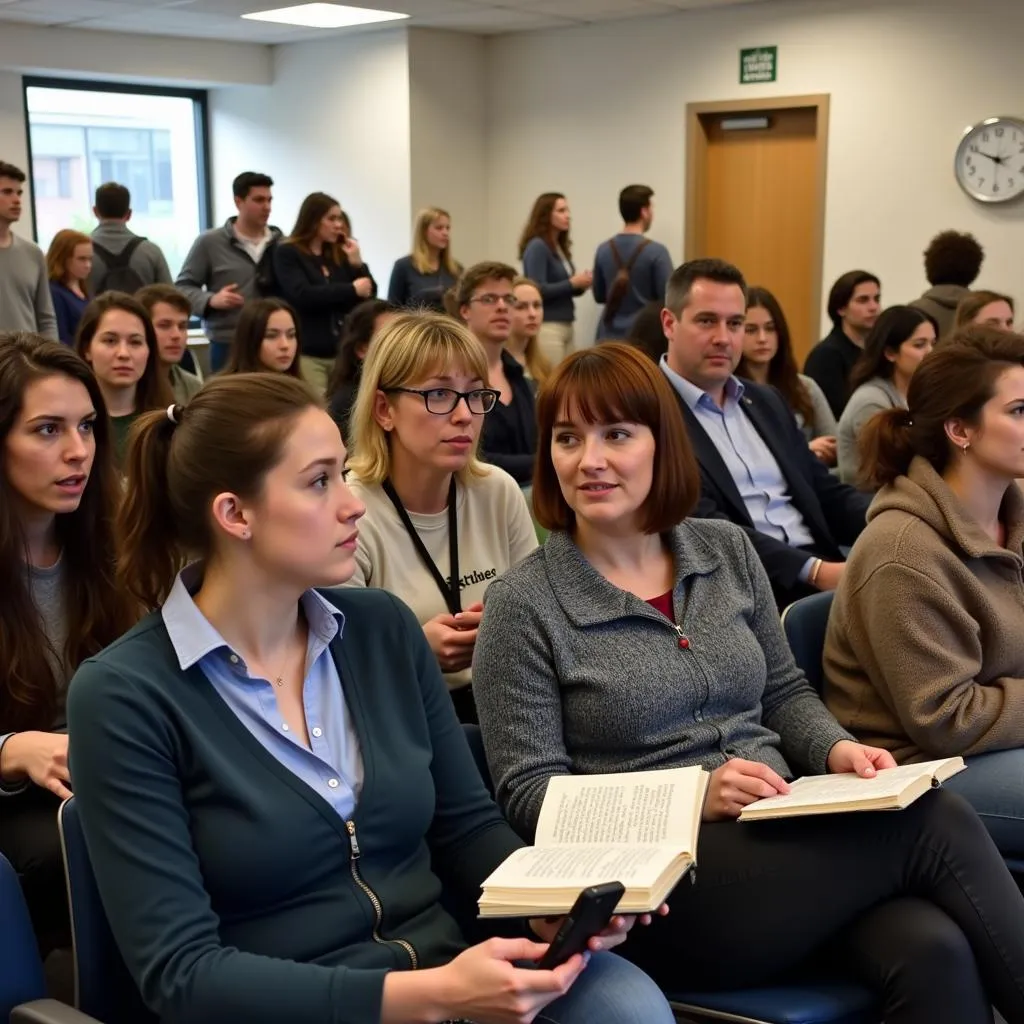The topic of describing a time when you were waiting for something special is a common theme in IELTS Speaking tests. It allows examiners to assess candidates’ ability to narrate personal experiences, express emotions, and use descriptive language. This topic has appeared frequently in past exams and is likely to remain relevant in future tests due to its universal nature and potential for diverse responses.
Nội dung bài viết
- Part 1: Introduction and Interview
- Question: Do you like waiting for things?
- Part 2: Long Turn (Cue Card)
- Cue Card:
- Follow-up Questions:
- Part 3: Two-way Discussion
- Question: Do you think people are becoming less patient in modern society? Why or why not?
- Question: In what situations do you think it’s important to be patient?
- Key Vocabulary and Phrases for High Scores
- Examiner’s Advice
Part 1: Introduction and Interview
In Part 1, the examiner may ask general questions related to waiting and anticipation. Here are some possible questions and a sample answer:
Question: Do you like waiting for things?
Sample Answer (Band 7-8):
To be honest, I’m not particularly fond of waiting, especially for extended periods. However, I’ve come to realize that anticipation can sometimes be an enjoyable part of an experience. For instance, when I’m looking forward to a special event or a long-awaited vacation, the build-up of excitement during the waiting period can be quite thrilling. That said, I do try to keep myself occupied and productive while waiting to make the time pass more quickly.
Part 2: Long Turn (Cue Card)
Cue Card:
Describe a time when you were waiting for something special. You should say:
- What you were waiting for
- How long you had to wait
- Why it was special to you
- How you felt while waiting
Sample Answer (Band 6-7):
I’d like to talk about the time I was waiting for my college acceptance letter. It was a nerve-wracking experience that lasted about two months after I submitted my application.
This was special to me because getting into this particular college had been my dream since high school. It was one of the top universities in my country, known for its excellent engineering program, which is what I wanted to study.
While waiting, I felt a mix of emotions. I was excited about the possibility of being accepted, but also anxious about the outcome. I remember constantly checking my email and the mailbox, hoping to see that important envelope.
To cope with the wait, I tried to keep myself busy with other activities. I spent time with friends, worked on some personal projects, and even started learning a new language to distract myself.
When the letter finally arrived, I was overjoyed to find out I had been accepted. The wait was definitely worth it, and it taught me the value of patience and perseverance.
Sample Answer (Band 8-9):
I’d like to recount the time I was eagerly anticipating the arrival of my first child. This monumental event spanned approximately nine months from the moment we discovered the pregnancy until the day of delivery.
The wait was exceptionally special to me as it marked a significant milestone in my life – the transition to parenthood. The prospect of becoming a father filled me with an overwhelming sense of responsibility and excitement for the future.
Throughout the waiting period, I experienced a kaleidoscope of emotions. There was unbridled joy at the thought of meeting our baby, coupled with trepidation about the challenges of raising a child. I found myself oscillating between eager anticipation and moments of anxiety about being adequately prepared for this life-changing role.
To make the most of this waiting period, I immersed myself in various preparatory activities. I voraciously read parenting books, attended prenatal classes with my partner, and even took up meditation to manage stress. These activities not only helped pass the time but also made me feel more equipped for the journey ahead.
The experience of waiting for my child taught me valuable lessons about patience, preparation, and the profound impact of anticipation on one’s perspective. It was a period of personal growth that I now look back on with fondness and appreciation.
Follow-up Questions:
- How did you manage your emotions during the waiting period?
- Did the experience change your perspective on waiting for important things in life?
Sample Answers (Band 7-8):
-
Managing my emotions during the waiting period was indeed challenging. I found that maintaining a routine and engaging in productive activities helped significantly. I also practiced mindfulness techniques like deep breathing and meditation to stay calm. Additionally, confiding in friends and family provided emotional support and helped me maintain a positive outlook.
-
This experience definitely altered my view on waiting for important things. It taught me that waiting can be a valuable period for preparation and personal growth. I learned to embrace the journey rather than fixating solely on the destination. Now, I try to approach waiting periods with more patience and use them as opportunities for self-improvement or reflection.
Sample Answers (Band 8-9):
-
To manage my emotions during this intense period of anticipation, I employed a multi-faceted approach. Firstly, I cultivated mindfulness through daily meditation and journaling, which helped me stay grounded and process my feelings constructively. I also channeled my energy into productive pursuits, such as learning new skills related to childcare and home management. Moreover, I found great solace in fostering open communication with my partner and close friends, creating a robust support system that provided both emotional comfort and practical advice.
-
This experience was truly transformative in reshaping my perspective on waiting for significant life events. It illuminated the intrinsic value of the waiting process itself, rather than viewing it as merely a means to an end. I’ve come to appreciate how periods of anticipation can serve as catalysts for personal development and deepened introspection. Now, I approach waiting with a more philosophical mindset, seeing it as an opportunity to hone patience, cultivate resilience, and engage in meaningful preparation. This shift in perspective has enriched my approach to life’s milestones, allowing me to find fulfillment in the journey as much as in the destination.
 IELTS Speaking: Describing waiting for something special
IELTS Speaking: Describing waiting for something special
Part 3: Two-way Discussion
In this section, the examiner will ask more abstract questions related to the topic of waiting and anticipation. Here are some potential questions and sample answers:
Question: Do you think people are becoming less patient in modern society? Why or why not?
Sample Answer (Band 6-7):
Yes, I believe people are becoming less patient nowadays. This is mainly due to the fast-paced nature of modern life and the instant gratification provided by technology. We’re used to getting information and services quickly, which makes us less tolerant of waiting. For example, people often get frustrated if a website takes more than a few seconds to load or if they have to wait in line at a store.
Sample Answer (Band 8-9):
I’m inclined to agree that there’s a discernible trend towards decreased patience in contemporary society. This phenomenon can be attributed to several intertwining factors. Primarily, the rapid technological advancements of our era have conditioned us to expect immediate results in various aspects of our lives. The instant accessibility of information, entertainment, and services at our fingertips has inadvertently fostered a culture of immediacy.
Moreover, the frenetic pace of modern life, particularly in urban settings, has cultivated a mindset where time is viewed as an increasingly scarce and valuable commodity. This perception often leads to a lowered tolerance for any activities or processes that are perceived as time-consuming or inefficient.
However, it’s crucial to note that this diminishing patience isn’t necessarily universal or irreversible. There’s a growing awareness of the benefits of mindfulness and slow living movements, which advocate for a more measured approach to life. These countercurrents suggest that while impatience may be prevalent, there’s also a burgeoning recognition of the value of patience and the quality of experience it can bring.
Question: In what situations do you think it’s important to be patient?
Sample Answer (Band 6-7):
I think it’s important to be patient in many situations, especially those involving personal growth or relationships. For example, when learning a new skill, patience is crucial because mastery takes time and practice. In relationships, being patient with others helps build understanding and trust. It’s also important to be patient when working towards long-term goals, as significant achievements often require sustained effort over time.
Sample Answer (Band 8-9):
Patience is a vital virtue in numerous contexts, but I believe it’s particularly crucial in scenarios that involve personal development, interpersonal relationships, and complex problem-solving.
In the realm of personal growth, patience is indispensable. Whether one is acquiring a new skill, overcoming a personal challenge, or working towards a long-term goal, progress often occurs incrementally. The ability to persevere in the face of setbacks and maintain motivation during plateaus is fundamentally linked to patience.
In interpersonal relationships, patience serves as a cornerstone for building understanding, empathy, and trust. It allows us to navigate conflicts constructively, appreciate diverse perspectives, and foster deeper connections. This is especially pertinent in professional settings, where collaboration and teamwork are often key to success.
Moreover, in complex problem-solving situations, patience is instrumental. Many of society’s most pressing issues – be they in the fields of science, politics, or social reform – require sustained effort and a willingness to grapple with ambiguity and setbacks. Patience enables us to approach these challenges with the necessary long-term perspective and resilience.
Lastly, I believe patience is paramount in our pursuit of personal well-being and happiness. In a world that often glorifies instant gratification, cultivating patience allows us to find contentment in the present moment and appreciate the journey as much as the destination.
 The importance of patience in various life situations
The importance of patience in various life situations
Key Vocabulary and Phrases for High Scores
To achieve a high score in IELTS Speaking, it’s crucial to use a range of sophisticated vocabulary and expressions. Here are some key terms and phrases that can elevate your responses:
-
Anticipation /ænˌtɪsɪˈpeɪʃn/ (noun): A feeling of excitement about something that is going to happen.
Example: “The anticipation of meeting my newborn child was overwhelming.” -
Monumental /ˌmɒnjʊˈmentl/ (adjective): Very important or significant.
Example: “Waiting for the election results was a monumental experience for the entire nation.” -
To cope with /kəʊp wɪð/ (phrasal verb): To deal successfully with a difficult situation.
Example: “I developed various strategies to cope with the stress of waiting for my exam results.” -
Nerve-wracking /ˈnɜːv ræk.ɪŋ/ (adjective): Causing a lot of worry or anxiety.
Example: “The days leading up to the job interview were absolutely nerve-wracking.” -
To make the most of (idiom): To use a situation or opportunity in the best possible way.
Example: “I tried to make the most of the waiting period by focusing on self-improvement.” -
Kaleidoscope of emotions (metaphor): A wide range of different feelings.
Example: “During the pregnancy, I experienced a kaleidoscope of emotions, from joy to anxiety.” -
To oscillate between /ˈɒsɪleɪt bɪˈtwiːn/ (phrase): To alternate between different states or feelings.
Example: “While waiting for the medical test results, I oscillated between hope and fear.” -
Profound impact (collocation): A very significant or deep effect.
Example: “The experience of waiting for something so important had a profound impact on my perspective.”
By incorporating these terms and phrases naturally into your responses, you can demonstrate a high level of English proficiency and improve your chances of achieving a higher band score in the IELTS Speaking test.
Examiner’s Advice
To excel in the IELTS Speaking test, particularly when describing experiences like waiting for something special, consider the following tips:
-
Practice Storytelling: Regularly practice narrating personal experiences, focusing on structuring your story with a clear beginning, middle, and end.
-
Develop Vocabulary: Expand your vocabulary related to emotions, time, and anticipation. Use these words naturally in your responses.
-
Use Idiomatic Expressions: Incorporate relevant idioms and collocations to add sophistication to your language.
-
Focus on Fluency: Aim for smooth delivery without too many hesitations. Regular practice can help improve your fluency.
-
Provide Detailed Responses: Elaborate on your answers by giving specific examples and explaining your thoughts and feelings.
-
Show Range: Demonstrate your ability to discuss both concrete experiences (Part 2) and abstract ideas (Part 3).
-
Practice Time Management: For the cue card task, practice speaking for the full 2 minutes without running out of things to say.
-
Reflect on Experiences: Analyze your own experiences of waiting and anticipation to have a pool of ideas to draw from during the test.
-
Listen Carefully: Pay close attention to the examiner’s questions to ensure your responses are relevant and on-topic.
-
Stay Calm: Remember that maintaining composure is crucial for clear communication, especially when discussing potentially emotional topics.
By following these tips and consistently practicing, you can improve your performance in the IELTS Speaking test and increase your chances of achieving a higher band score.
 IELTS Speaking Test Preparation
IELTS Speaking Test Preparation
Remember, the key to success in the IELTS Speaking test is not just about having good news to share, but about how effectively you can communicate your experiences and thoughts. With dedicated practice and the right strategies, you can significantly improve your performance and achieve your desired score.


